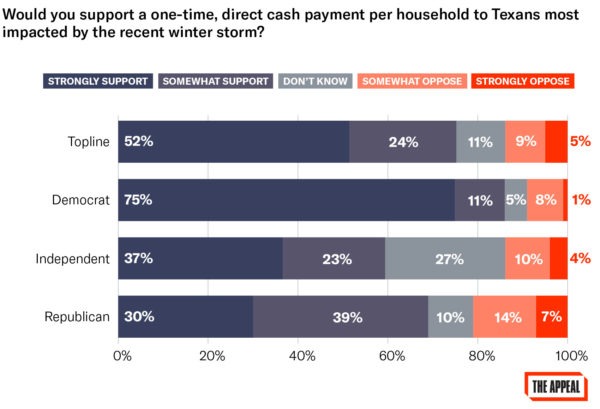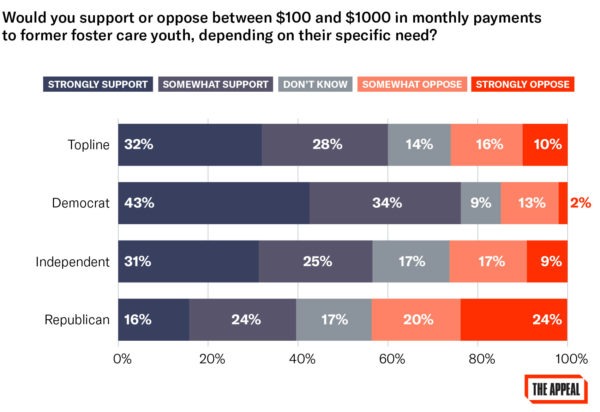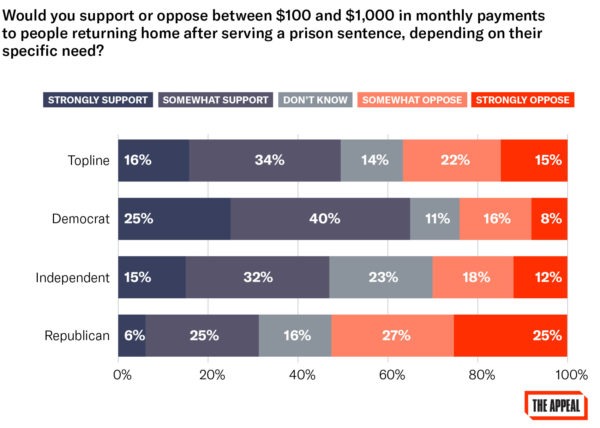Bexar County Voters: Use Cash Relief to Promote Economic Stability
A new poll shows San Antonio voter support for direct cash payments to those who recently experienced a crisis or need help reaching economic stability.

A new poll from The Lab, a policy vertical of The Appeal, shows that likely voters in the San Antonio area support providing direct cash payments to people who have recently experienced a crisis or who need help reaching economic stability.
- Seventy-six percent of likely voters in Bexar County support a one-time cash payment to help compensate the households most impacted by the recent winter storms and aftermath;
- Sixty percent of likely voters support monthly payments between $100 and $1000 to young adults transitioning out of foster care; and
- Fifty percent support providing monthly payments between $100 and $1000 to previously-incarcerated individuals who are returning to society, with only 37 percent opposed.
Polling and Findings
Many Texans are facing extensive costs as a result of the recent winter storms. These include high energy bills, home damage, and other costs.

Experts believe that economic stability for vulnerable populations during times of transition will decrease the risk of individuals becoming homeless, incarcerated, and other harmful outcomes for both individuals and their communities.


Key Context
Millions of American households are experiencing dire economic pain. Many of them were already living on the brink, with one missed paycheck or unexpected expense standing between them and financial ruin. Now the pandemic has resulted in the loss of jobs, housing, and savings, despite efforts by the federal government to alleviate the worst suffering.
A growing coalition of mayors, including San Antonio Mayor Ron Nirenberg, have signed onto a coalition called Mayors for Guaranteed Income (MGI) to advocate for more support for their constituents, including a guaranteed income at the local, state, and federal level.
Direct, unconditional cash payments combined with existing social safety nets can help people achieve financial stability. Unlike traditional government assistance programs, guaranteed income gives individuals flexibility to meet their most pressing needs. And for individuals who have few to no existing resources, it can be the difference in managing baseline survival: Providing shelter, facilitating a job search, or subsidizing child care. Further, the premise behind these initiatives is powerful: it respects the dignity of recipients by recognizing that all people need a basic threshold for survival and by giving individuals more autonomy over how they choose to spend the money.
In the absence of meaningful federal action, many local officials have advanced pilot programs to provide direct cash assistance to targeted populations. For instance, a new Santa Clara County public-private partnership provides unconditional, direct-cash payments to youth aging out of foster care. The program’s first round of 72 recipients will each receive $1,000 a month, as well as financial mentorship and advising provided through public-private partnerships.
Similarly, city officials in Durham, NC, and Gainesville, FL, have sought private funding to provide formerly-incarcerated individuals with a monthly stipend. People returning to society from prison face stigma that makes it difficult to secure a job or safe housing options. Monthly financial support gives these individuals a chance to rebuild their lives and diminishes the likelihood of recidivism.
In San Antonio, where public support for direct payments is strong, residents are still waiting to see what concrete proposals Mayor Nirenberg will offer.
Polling Methodology
From February 27 to March 6, 2021, The Appeal conducted a survey of 420 Bexar County adults web panel respondents in English and Spanish. The sample was weighted to be representative of likely voters by age, gender, education, race, and voting history. The survey was conducted in English. The margin of error is ± 4.75 percentage points.

